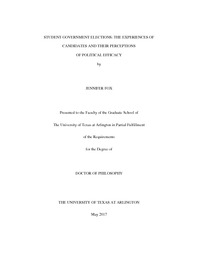
ATTENTION: The works hosted here are being migrated to a new repository that will consolidate resources, improve discoverability, and better show UTA's research impact on the global community. We will update authors as the migration progresses. Please see MavMatrix for more information.
Show simple item record
| dc.contributor.advisor | Tobolowsky, Barbara | |
| dc.creator | Fox, Jennifer | |
| dc.date.accessioned | 2017-07-03T14:13:12Z | |
| dc.date.available | 2017-07-03T14:13:12Z | |
| dc.date.created | 2017-05 | |
| dc.date.issued | 2017-04-25 | |
| dc.date.submitted | May 2017 | |
| dc.identifier.uri | http://hdl.handle.net/10106/26765 | |
| dc.description.abstract | This qualitative study fills a void in the research on collegiate student government elections by examining the experiences of 10 candidates for president and vice president at large, public, four-year universities in Texas. Participation in student government has been shown to support students’ learning and lead to future political engagement. However, until this study, little has been understood about the experiences of candidates in the student government elections process. Using political efficacy (Campbell et al., 1954) as a theoretical framework for the coding and analysis of the data, several themes emerged, including the students’ motivations for running for president or vice president, the nature of the campaigning process, lessons learned throughout the election, and the candidates’ perceptions of future political participation.
Each of the participants perceived their experience as a candidate in student government elections to be a valuable learning experience, which helped them gain an understanding of how politics works and their valued role in the American democracy. However, the campaigning process brought many challenges including feelings of vulnerability from public scrutiny, which had a physical and emotional toll on the participants. Overall, their candidacy influenced their perceptions of political efficacy and inspired their continued involvement in politics, whether highly engaged or more pragmatic.
Implications for practice include the need for student affairs practitioners to offer guidance and resources for candidates to provide them the support needed to meet the challenges of the election. In addition, the creation of an ombudsman position to oversee campaign behavior would be helpful to ensure the integrity of the election. In regard to theory, this is the first known study to apply the theory of political efficacy to student government elections at the university-level. Through adapting the assumptions of the theory to match the student government realm, political efficacy was able to help explain why students may choose to run for student leadership positions and how they perceive the power of their student government organization. | |
| dc.format.mimetype | application/pdf | |
| dc.language.iso | en_US | |
| dc.subject | Student government | |
| dc.subject | Elections | |
| dc.subject | Political efficacy | |
| dc.subject | Universities | |
| dc.subject | Student government president | |
| dc.subject | Student government vice president | |
| dc.subject | Student affairs | |
| dc.title | Student Government Elections: The Experiences of Candidates and Their Perceptions of Political Efficacy | |
| dc.type | Thesis | |
| dc.degree.department | Educational Leadership and Policy Studies | |
| dc.degree.name | Doctor of Philosophy in Educational Leadership and Policy Studies | |
| dc.date.updated | 2017-07-03T14:13:43Z | |
| thesis.degree.department | Educational Leadership and Policy Studies | |
| thesis.degree.grantor | The University of Texas at Arlington | |
| thesis.degree.level | Doctoral | |
| thesis.degree.name | Doctor of Philosophy in Educational Leadership and Policy Studies | |
| dc.type.material | text | |
| dc.creator.orcid | 0000-0003-3855-1468 | |
Files in this item
- Name:
- FOX-DISSERTATION-2017.pdf
- Size:
- 1.006Mb
- Format:
- PDF
This item appears in the following Collection(s)
Show simple item record


